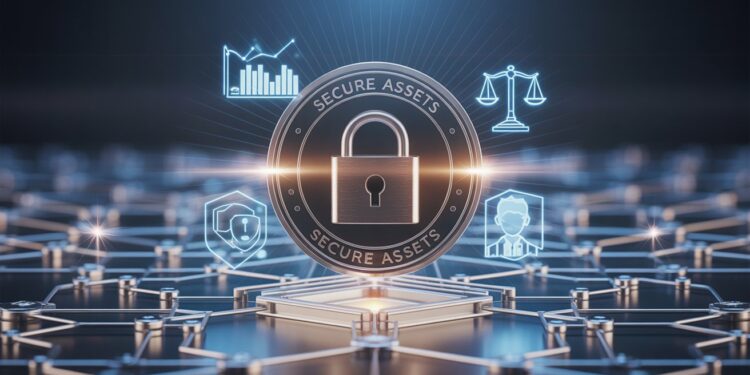Introduction
In the evolving world of blockchain and finance, security tokens are gaining massive attention. As regulations tighten and digital assets become more mainstream, the demand for secure and compliant investment instruments on the blockchain has grown. Security tokens offer a unique bridge between traditional finance and decentralized technology, enabling companies to raise capital more efficiently while offering investors legally compliant, tradable assets.
If you’re new to this space, this beginner’s guide to security tokens will walk you through everything you need to know—what they are, how they differ from utility tokens, their benefits, and why they are considered the future of regulated digital finance.
What Are Security Tokens?
Security tokens are digital representations of traditional financial securities (such as stocks, bonds, or real estate) issued on a blockchain. These tokens derive their value from an underlying external asset and are subject to federal securities regulations. Think of them as tokenized versions of assets you would typically buy through a stockbroker or investment firm.
For instance, a real estate company could tokenize ownership of a building, offering investors fractional shares through a blockchain platform. Each share, represented as a token, could then be traded securely and transparently.
Unlike cryptocurrencies such as Bitcoin or Ethereum, which are often used as digital currencies or store of value, security tokens represent ownership in an asset and provide rights such as dividends, profit-sharing, or voting.
Security Tokens vs. Utility Tokens
A common point of confusion for beginners is the difference between security tokens and utility tokens.
- Security Tokens grant holders rights similar to traditional securities. They are regulated, and their issuance typically requires compliance with laws such as the U.S. SEC’s securities regulations.
- Utility Tokens, on the other hand, provide access to a service or product within a blockchain ecosystem. They are not intended as investments and typically don’t confer ownership or financial rights.
The Howey Test is often used by regulators to determine whether a token qualifies as a security. If a token meets criteria such as an expectation of profit derived from the work of others, it is likely considered a security.
Benefits of Security Tokens
Security tokens bring together the best of two worlds—blockchain innovation and financial compliance. Here are some notable benefits:
- Fractional Ownership
One of the key advantages of security tokens is fractionalization. Investors can own a small percentage of high-value assets like commercial real estate, art, or venture capital—opening up access to markets that were previously reserved for institutional players.
- Increased Liquidity
Traditionally, assets like private equity or real estate are illiquid and hard to trade. With tokenization, these can be traded on regulated secondary markets, improving liquidity and enabling faster exits.
- Global Reach
Security tokens are borderless by nature. They allow companies to reach a global pool of investors without the friction of traditional systems, lowering barriers to entry and increasing funding opportunities.
- Cost and Time Efficiency
By utilizing smart contracts and blockchain automation, issuing and managing securities becomes faster, cheaper, and more transparent. There’s reduced need for intermediaries like custodians, clearing houses, or registrars.
- Enhanced Transparency and Security
Blockchain technology ensures immutability and traceability, providing investors and regulators with a transparent view of asset ownership, history, and transfers—building trust and reducing fraud.
Use Cases of Security Tokens
Security tokens are being explored in various industries. Let’s look at some real-world applications:
– Real Estate
Property developers tokenize real estate assets, allowing investors to buy into large-scale projects with as little as $500 or less. This democratizes real estate investment and streamlines the ownership and transfer process.
– Private Equity and Venture Capital
Startups and private companies issue security tokens as a way to raise funds while providing early investors with tradable ownership stakes. It improves exit options for early-stage backers.
– Commodities and Precious Metals
Gold, oil, and other commodities can be tokenized, enabling more flexible trading while ensuring the digital asset is backed by a physical counterpart.
– Debt Instruments
Bonds and loans can be issued as security tokens, giving lenders and borrowers access to automated interest payments, faster settlement, and secondary trading opportunities.
How Security Token Offerings (STOs) Work
Security Token Offerings (STOs) are the blockchain equivalent of traditional securities offerings. Companies looking to raise capital can issue digital tokens that represent equity, debt, or other forms of securities. However, unlike Initial Coin Offerings (ICOs), STOs are regulated and must comply with local financial laws.
Here’s a simplified flow of how an STO works:
- Preparation & Legal Compliance
Legal teams assess the structure, ensure regulatory compliance, and prepare the necessary filings. - Token Creation
Developers issue tokens on a blockchain platform (often Ethereum, Polygon, or specialized STO blockchains like Polymesh or Securitize). - Investor Onboarding
Investors must pass KYC/AML checks before participating in the STO. - Token Distribution
Once verified, investors receive security tokens in exchange for fiat or crypto. - Secondary Trading
Post-STO, tokens may be traded on regulated security token exchanges such as tZERO, INX, or Archax.
Legal and Regulatory Considerations
Because security tokens fall under securities law, compliance is non-negotiable. This includes:
- Registration with financial authorities (e.g., SEC in the U.S., FCA in the UK)
- Implementing Know Your Customer (KYC) and Anti-Money Laundering (AML) policies
- Filing offering memorandums and disclosures
- Ensuring tokens meet legal definitions of a security
In the U.S., exemptions such as Reg D, Reg S, Reg A+, and Reg CF are often used for STOs to legally raise capital from accredited and retail investors.
Navigating these requirements requires careful planning, legal advice, and often partnering with token issuance platforms that are already compliant.
Challenges and Risks
Despite their potential, security tokens face some challenges:
- Regulatory Complexity: Global regulatory uncertainty can limit cross-border investment opportunities.
- Liquidity Constraints: While security tokens improve liquidity, the market is still young and lacks the deep liquidity seen in public stock exchanges.
- Technology Barriers: Integrating smart contracts with compliance requirements demands robust and secure infrastructure.
- Investor Education: Many investors are still unaware or skeptical of tokenized securities, leading to slower adoption.
That said, the ecosystem is rapidly maturing with increasing institutional interest, regulatory clarity, and infrastructure development.
Popular Security Token Platforms
If you’re considering issuing or investing in security tokens, here are a few leading platforms to explore:
- Securitize – A regulated platform for issuing and managing digital securities
- Polymath – A pioneer in token standards and compliance tools for security tokens
- tZERO – A security token exchange that allows secondary trading
- INX – A fully regulated STO platform and exchange
- Tokeny – Offers infrastructure for compliant tokenization in the EU
These platforms offer end-to-end solutions including KYC, investor onboarding, token creation, legal support, and secondary trading capabilities.
The Future of Security Tokens
Security tokens are expected to transform capital markets over the next decade. As institutions adopt blockchain, and regulators build clearer frameworks, we’ll likely see traditional assets like stocks, mutual funds, and even central bank debt issued as tokenized assets.
Major banks and governments are already experimenting with tokenization. BlackRock, for example, launched tokenized funds on Ethereum. Meanwhile, jurisdictions like Switzerland, Singapore, and the UAE are positioning themselves as global hubs for digital securities.
According to reports by the World Economic Forum, 10% of global GDP will be stored on blockchain by 2027—and security tokens are expected to play a big role in that future.
Final Thoughts
Security tokens are reshaping the financial world by making traditional assets more accessible, transparent, and efficient. They bring the trust of traditional finance and the innovation of blockchain under one roof.
For beginners, this space might feel complex at first—but by understanding the basics, the legal landscape, and the platforms available, you’ll be well on your way to exploring one of the most promising innovations in digital finance.
Whether you’re an investor seeking fractional real estate, a startup raising capital, or simply curious about blockchain finance, security tokens offer a compelling new frontier worth watching.
Join Us : Twitter | Website | GitHub | Telegram | Facebook | YouTube

























